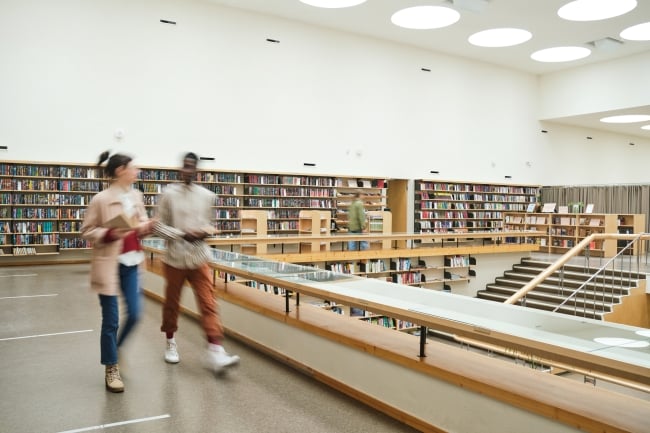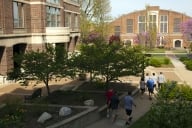You have /5 articles left.
Sign up for a free account or log in.

Some campus libraries have 24-7 lounges or rooms that allow students to hang out, study or eat, benefiting commuter students, who may lack another space on their college campus.
AnnaStills/iStock/Getty Images Plus
College students are known for their late-night study habits, but where do they go when the libraries close in the evenings?
Some colleges and universities have established 24-7 spaces connected to library facilities to support commuter students and others who need campus resources outside of typical operating hours. While services vary on each campus, the opportunity to study in a secure location at any time of day benefits students and their academic success.
The need: College libraries often have limited hours during the week and will expand hours during exam periods. A 2010 survey of 66 Association of Research Library members by a Washington University in St. Louis librarian found 36 percent of respondents have 24-7 or 24-5 access in limited spaces secured separately from the rest of the library.
Commuter students particularly face unique challenges compared to their residential peers in finding spaces to study, relax or eat a meal. Some campuses have a designated commuter lounge, but often these rooms have limited hours.
The setup: At Randolph-Macon College in Virginia, the McGraw-Page Library has a 24-7 study space on the first floor, the Abernathy Room. Inside are a printer, coffee machine, minifridge, vending machine, bathroom and a stack of lockers that students can use. The maximum capacity is 82.
Towson University in Maryland has a similar room, the Study Lounge, which has various seating arrangements, a printing station, coffee and food vending machines, and outlets for charging.
At Emporia State University, the spacious Library Learning Commons on the first floor is open at all times, featuring several desktop computers, a laptop kiosk and vending machines. Due to the popularity of the space, librarians are looking into creating a second 24-7 space for students, says Alex Mosakowski, first-year experience and student success librarian.
American University in Washington, D.C., established 24-7 access to the Bender Library in fall 2022, allowing campus stakeholders to access the entire first floor of the library, which includes stacks and study spaces, study rooms, a mothers’ room, and restrooms.
Most commonly, colleges and universities (including those listed above) implement a digital security system for students, faculty or staff to swipe in to the 24-7 space, meaning there is no need for security or library staff to be on-site at all times.
Student perspective: “Space is important for all of our students, but particularly our commuter students,” Tim Berge, student success librarian at Randolph-Macon, shared in a conference session at the National Resource Center for the First-Year Experience and Students in Transition Annual Conference in Seattle.
Commuter students are more likely to spend more time in the library and therefore should be considered in how space is utilized, Berge added.
The addition of a coffee machine and the location of lockers, for example, were direct results of Berge meeting with commuter students and asking them about their experiences with the library.
We bet your colleague would like this article, too. Send them this link to subscribe to our weekday newsletter on Student Success.








